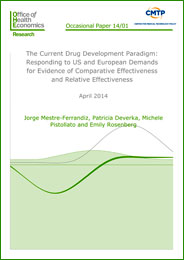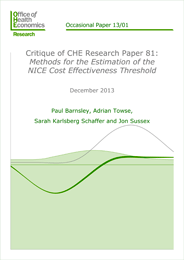Sign up to our newsletter Subscribe
The Current Drug Development Paradigm: Responding to US and European Demands for Evidence of Comparative Effectiveness and Relative Effectiveness

Sign up to our newsletter Subscribe


The cost of R&D for a successful new medicine has been an important policy issue at least since the 1960s. Cost estimates matter not just because of intellectual curiosity or for industry understanding of its performance, but because they are a key aspect of the international debate about the reasonableness of pharmaceutical prices and the magnitude of the long-term investments involved.
This publication reviews research published over the last three decades, which shows an increase in costs from £125 million ($199 million) per new medicine in the 1970s to £1.2 billion ($1.9 billion) in the 2000s (both in 2011 prices). An OHE costs analysis based on new data for 1998-2002 agrees with comparable analyses for the same time period.
The study explores four major factors that are producing higher R&D costs: out-of-pocket expenses, success/failure rates, R&D times and the cost of capital. It also discusses measures companies are taking now to improve efficiency and offers a glimpse into the promise and challenges presented by the new, gene-based sciences.
An error has occurred, please try again later.
This website uses cookies so that we can provide you with the best user experience possible. Cookie information is stored in your browser and performs functions such as recognising you when you return to our website and helping our team to understand which sections of the website you find most interesting and useful.
Strictly Necessary Cookie should be enabled at all times so that we can save your preferences for cookie settings.
If you disable this cookie, we will not be able to save your preferences. This means that every time you visit this website you will need to enable or disable cookies again.
This website uses Google Analytics to collect anonymous information such as the number of visitors to the site, and the most popular pages.
Keeping this cookie enabled helps us to improve our website.
Please enable Strictly Necessary Cookies first so that we can save your preferences!